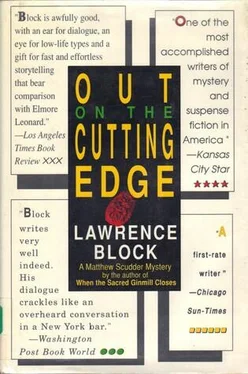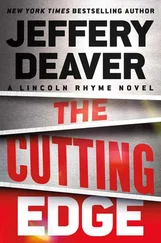“What happened to Farrelly?”
“Why should I know? Maybe he’s in Tahiti, drinking the milk of coconuts and fucking little brown-skinned girls. Did anyone ever find his body? Or the legendary fucking head?”
“What did Eddie know that made him dangerous?”
“Nothing. He didn’t know a damn thing. He was no danger to me.”
“Who could he have been a danger to?”
“Nobody I can think of. What did he ever do? He did some thieving. He went along with some boys who took a load of furs out of a loft on Twenty-seventh Street. That’s the biggest thing I can think of that he was a part of, and there’d be no stink coming off that one. It was all arranged, the owner let them have the key. He wanted the insurance. And it was years ago, years ago. Who was he a danger to? Jesus, didn’t he hang himself? Wasn’t it himself he was a danger to?”
Something happened between us, something that I find hard to explain, or even to understand. We were silent for a few minutes, having run out of things to say about Eddie Dunphy. Then he told a story about his brother Dennis, how he’d taken the blame for something Dennis had done when they were children. Then I told a couple of cop stories from when I was attached to the Sixth Precinct in the Village.
Somehow or other something bonded us. At one point he walked all the way to the back end of the bar and came around behind it. He filled two glasses with ice cubes, then ran them both full of Coca-Cola and passed them over the bar to me. He took a fresh fifth of the twelve-year-old Jameson from the back bar, put a couple of ice cubes in a clean glass, and came around the bar again, leading me to a booth in the corner. I put my two Cokes on the table in front of me, and he cracked the seal on the whiskey bottle and filled his glass, and we sat there for the next hour or so, telling stories, sharing silences.
It didn’t happen all that often in the drinking days and it hasn’t happened often since. I don’t think you could say that we became friends. Friendship is something different. It was as if some inner barrier that each of us ordinarily maintained was, for the moment, dissolved. Some internal truce had been declared, with hostilities suspended for the holidays. For an hour we were easier with each other than old friends, than brothers. It was not the sort of thing that could last much longer than an hour, but that made it no less real.
At length he said, “By God, I wish you drank.”
“Sometimes I wish it myself. But most of the time I’m glad I don’t.”
“You must miss it.”
“Now and then.”
“I’d miss it like fury. I don’t know if I could live without it.”
“I had more trouble living with it,” I said. “The last time I drank I wound up with a grand mal seizure. I fell down in the street and woke up in the hospital with no idea of where I was or how I got there.”
“Christ,” he said, and shook his head. “But until then,” he said, “you had a good long run at it.”
“That I did.”
“Then you can’t complain,” he said. “We can’t any of us complain, can we?”
Around midnight it began to wear thin. I was starting to have the feeling that I’d stayed too long at the dance. I stood up and told Ballou I had to get on home.
“Are you all right to walk? Do you want me to call a car for you?” He caught himself and laughed. He said, “Jesus, all you’ve been drinking is Coca-Cola. Why shouldn’t you be all right to get home under your own power?”
“I’m fine.”
He hauled himself to his feet. “Now that you know where we are,” he said, “come back and see us again.”
“I’ll do that.”
“I enjoyed this, Scudder.” He laid a hand on my shoulder. “You’re all right.”
“You’re all right yourself.”
“It’s a damn shame about Eddie. Did he have any family at all? Will there be a wake for him, do you know?”
“I don’t know. The city’s holding the body for the time being.”
“Hell of a way to end up.” He sighed, then straightened up. “We’ll talk again, you and I.”
“I’d like that.”
“I’m here most nights, off and on. Or they know how to reach me.”
“Your early-shift bartender wouldn’t even admit he knew who you were.”
He laughed. “That’s Tom. He’s a close one, isn’t he? But he gave me your message, and so did Neil. Whoever’s behind the bar here can get word to me.”
I reached into my pocket, got out a card. “I’m at the Northwestern Hotel,” I said. “Here’s the number. I’m not there much, but they’ll take messages.”
“What’s this?”
“My number.”
“This,” he said. I looked, and he had the card turned and was looking at the picture of Paula Hoeldtke. “The girl,” he said. “Who is she?”
“Her name’s Paula Hoeldtke. She’s from Indiana, and she disappeared over the summer. She lived in the neighborhood, she worked at a few restaurants nearby. Her father hired me to find her.”
“Why give me her picture?”
“It’s the only thing I’ve got with my name and number on it. Why? Do you know her?”
He studied her picture, then raised his green eyes to meet mine. “No,” he said. “I never saw her.”
The phone woke me, wrenching me out of a dream. I sat up in bed, grabbed for the phone, got it to my ear. A voice, half in a whisper, said, “Scudder?”
“Who is this?”
“Forget about the girl.”
There’d been a girl in the dream but the dream was melting off like snow in the sun. I couldn’t bring her image into focus. I didn’t know where the dream ended and the phone call began. I said, “What girl? I don’t know what you’re talking about.”
“Forget about Paula. You’ll never find her, you can’t bring her back.”
“From where? What happened to her?”
“Quit looking for her, quit showing her picture around. Drop the whole thing.”
“Who is this?”
The phone clicked in my ear. I said hello a couple of times, but it was useless. He was gone.
I switched on the bedside lamp, found my watch. It was a quarter to five. It had been past two by the time I turned the light out, so I’d had less than three hours. I sat on the edge of the bed and went over the conversation in my mind, trying to find a deeper message behind the words, trying to place the voice. I had the feeling I’d heard it before but couldn’t draw a bead on it.
I went into the bathroom and caught sight of my reflection in the mirror over the sink. All my years looked back at me, and I could feel their weight, pressing down on my shoulders. I ran the shower hot and stood under it for a long time, got out, toweled dry, got back into bed.
“You’ll never find her, you can’t bring her back.”
It was too late or too early, there was no one I could call. The only person I knew who might be awake was Mickey Ballou, and he’d be too drunk by now, and I didn’t have a number for him. And what would I say to him anyway?
“Forget about the girl.”
Was it Paula I’d been dreaming about? I closed my eyes and tried to picture her.
When I awoke a second time it was ten o’clock and the sun was shining. I was up and half-dressed before I remembered the phone call, and at first I wasn’t entirely certain if it had actually happened. My towel, tossed over a chair and still damp from my shower, provided physical evidence. I hadn’t dreamed it. Someone had called me, urging me off a case I had already pretty much dropped.
The phone rang again as I was tying my shoelace. I answered it and said a guarded “Hello,” and Willa said, “Matt?”
“Oh, hi,” I said.
“Did I wake you? You didn’t sound like yourself.”
Читать дальше












